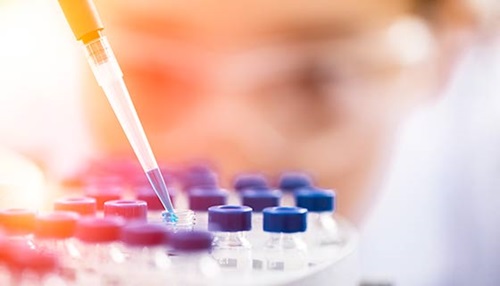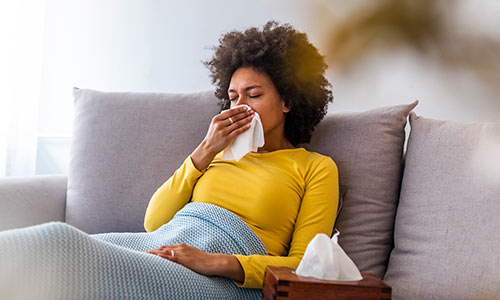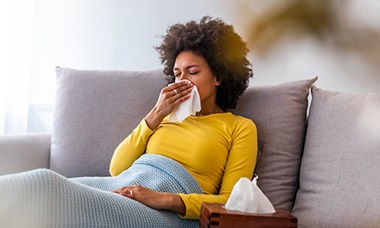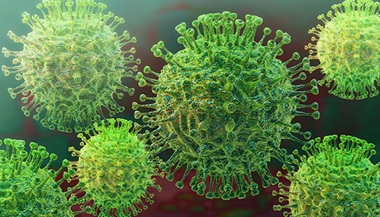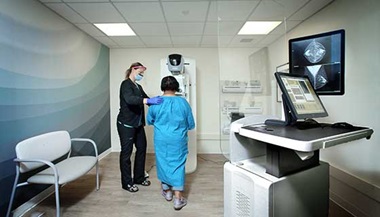COVID Symptoms — Frequently Asked Questions
Reviewed By:
Do you know the symptoms of COVID-19? Knowing the warning signs can help you take the right steps if you or loved ones become sick. Lisa Maragakis, M.D., M.P.H., senior director of infection prevention for the Johns Hopkins Health System, explains what to look for and when to get help.
What are symptoms of COVID-19?
The most common symptoms are:
- Cough
- Fever or chills
- Shortness of breath or difficulty breathing
- Muscle or body aches
- Sore throat
- New loss of taste or smell
- Diarrhea
- Headache
- Fatigue
- Nausea or vomiting
- Congestion or runny nose
Some of these symptoms are very common and can occur due to many conditions other than COVID-19, the disease caused by the coronavirus called SARS CoV-2. If you have any of the symptoms, contact a doctor or other health care provider, who can assess your risk and help you determine the next steps.
Emergency Warning Signs of Severe COVID-19 — When to Call 911
If you or someone in your household is experiencing any of the following symptoms, call 911 or your local emergency room right away and let the operator know that you are calling for someone who might have COVID-19:
- Difficulty breathing
- Persistent pain or pressure in the chest
- New confusion
- Inability to wake up or stay awake
- Bluish lips or face
There are other possible symptoms of COVID-19. Call your doctor or health care center regarding any symptoms that are severe or concerning to you.
When should I contact a doctor about my symptoms?
If you feel ill, call your doctor’s office or health care center and explain your symptoms over the phone. The next steps will be discussed, including whether you should have a coronavirus test. If it turns out that you have COVID-19, mild cases can be managed at home with rest and self-isolation. If you become severely ill, you may need hospital care.
If I’m exposed to the coronavirus, how long will it be before I might develop symptoms?
Symptoms can begin two to 14 days after you have been infected with SARS-CoV-2. A study led by researchers at the Johns Hopkins Bloomberg School of Public Health shows that the median time for symptoms to show up is about five days, however, CDC research suggests that the median time for omicron symptoms to develop is about three days.
If you suspect you were exposed to or had close contact with someone with COVID-19, you should self-quarantine, watch for symptoms and consider getting tested four or five days following the exposure. Exposure is contact with someone infected with SARS-CoV-2, the virus that causes COVID-19, in a way that increases the likelihood of becoming infected with the virus. Close contact is being less than 6 feet away from an infected person (laboratory-confirmed or a clinical diagnosis) for a cumulative total of 15 minutes or more during a 24-hour period.
Please review CDC guidelines for isolation and quarantine to help prevent the spread of COVID-19
What are the first symptoms of coronavirus infection?
Early symptoms reported by some people include fatigue, headache, sore throat and fever. Others experience a loss of smell or taste. COVID-19 can cause symptoms that are mild at first, but then become more intense over five to seven days, with worsening cough and shortness of breath. Some people who have COVID-19 develop pneumonia.
The type and severity of first symptoms can vary widely from person to person. This is why it is very important to call your doctor if you have symptoms, even mild ones.
Can you have the coronavirus without a fever?
Yes. A fever is one of the common symptoms of COVID-19, but you can be infected with the coronavirus and have a cough or other symptoms with no fever, or a very low-grade one — especially in the first few days. Keep in mind that it is also possible to have the coronavirus with minimal symptoms or even no symptoms at all. People infected with the coronavirus who have no symptoms can still spread the virus to others.
Can you have the coronavirus without a cough?
Yes. A cough is one of the common symptoms of COVID-19, but it is not always present. You can be infected with the coronavirus and not have a cough. If you do have one, it may be mild and infrequent, or you may cough heavily at times. Remember that it is possible to have COVID-19 with minimal symptoms or even no symptoms at all. People infected with the coronavirus who have no symptoms can still spread the virus to others.
Can COVID-19 symptoms come and go?
Yes. During the recovery process, people with COVID-19 might experience recurring symptoms alternating with periods of feeling better. Varying degrees of fever, fatigue and breathing problems can occur, on and off, for days or even weeks.
Can you have COVID-19 without symptoms?
Yes. Symptoms of COVID-19 usually show up two to 14 days after exposure to SARS-CoV-2, but some people who are infected do not develop symptoms or feel ill. When this happens, a person is called asymptomatic. This is why it is so important to wear a face mask and to practice physical distancing and hand hygiene. People can be infected with the virus that causes COVID-19 and not realize it, but still be able to transmit the virus to other people.
What are COVID-19 symptoms in children?
Like adults, babies and children with COVID-19 can have symptoms including fever, cough, sore throat, difficulty breathing and diarrhea. Cases have been increasing among children, as indicated by recent data from the American Academy of Pediatrics.
Children may also be at risk for multisystem inflammatory syndrome in children (MIS-C) — an uncommon but serious complication of the coronavirus. Parents and guardians should be on guard for signs of MIS-C and call their child’s doctor immediately if they appear.
Coronavirus Symptoms and Other Conditions:
How are coronavirus symptoms different from allergy symptoms? What about flu, colds and strep throat?
COVID-19 shares symptoms with other conditions such as allergies, the flu and strep throat. It may be very hard to tell the difference between COVID-19 and flu without a test.
If you have symptoms that might be due to the coronavirus, contact a health care provider, describe your symptoms and follow the provider’s recommendations.
Learn more about COVID-19 and the flu.
If I receive the coronavirus vaccine, will I get COVID-19 symptoms?
No. The COVID-19 vaccines authorized by the Food and Drug Administration cannot and will not give you COVID-19. These coronavirus vaccines can cause side effects because they activate your immune system, but this does not mean you are infected with the coronavirus or that you have COVID-19. As your immune system responds to the vaccine and learns to recognize and fight the coronavirus, fever, pain at the injection site and muscle aches are possible, but these are usually both mild and temporary. Learn more about the safety of the coronavirus vaccines.


